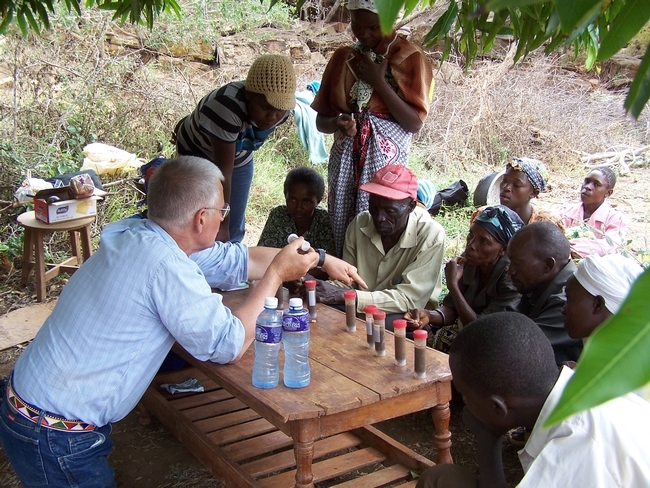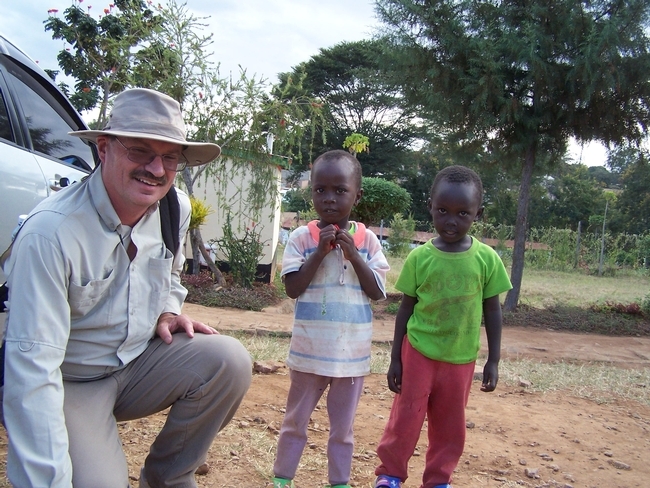Posts Tagged: USAID
More irrigation for climate-smart farming and food security in Guatemala
Connecting 9,000 rural households in Guatemala with improved water management and climate-smart agriculture strategies is the goal of a new project led by a team at UC Davis, to ultimately increase food security and reduce poverty in Guatemala's Western Highlands.
“The opportunity to impact so many farmers' lives on this scale is exciting,” said Beth Mitcham, director of the Horticulture Innovation Lab and a UC Cooperative Extension specialist in the UC Davis Department of Plant Sciences. “We're taking lessons learned from our previous research — in Guatemala, Honduras and Cambodia — and building a team to help more small-scale farmers apply our findings and successfully use these innovative practices.”
The new project is part of the U.S. government's global hunger and food security initiative, Feed the Future. The project represents an additional $3.4 million investment in the UC Davis-led Horticulture Innovation Lab by the U.S. Agency for International Development's mission in Guatemala.
The project's international team also includes representatives from Kansas State University; North Carolina Agricultural and Technical State University; the Centro de Paz Bárbara Ford in Guatemala; Universidad Rafael Landívar in Guatemala; and the Panamerican Agricultural School, Zamorano, in Honduras.
“The learning shared between these three U.S. universities and the universities in Honduras and Guatemala will be enriching for all of the institutions involved,” said Manuel Reyes, research professor at Kansas State University who is part of the team. “I find it satisfying that these academic institutions will be investing intellectually in marginalized groups in Guatemala's Western Highlands — and in turn, learning from them too.”
Helping youth envision a future in agriculture
By partnering with local youth groups and agricultural schools, the team will better prepare students for jobs in commercial agriculture and agricultural extension with knowledge of climate-resilient conservation and water management practices.
“Our local team is training youth as entrepreneurs, to see agriculture as an economic opportunity instead of just back-breaking work,” said Meagan Terry, UC Davis junior specialist who is managing the project in Guatemala for the Horticulture Innovation Lab. “They can envision a future in agriculture, with innovative ways to create value-added products or grow high-value crops for niche markets.”
As rainfall patterns vary with climate change, farmers in this region are expected to face increased competition for water. Practices such as rainwater harvesting, drip irrigation and conservation agriculture will become more necessary for small-scale farmers.
Climate-smart lessons from conservation agriculture, drip irrigation
In previous research, the Horticulture Innovation Lab has found that combining drip irrigation with conservation agriculture practices can successfully grow vegetables on small plots of land, without significant yield reductions. These practices improve soil structure, moisture retention and soil health.
Additionally, women farmers who participated in the Horticulture Innovation Lab studies in Cambodia, Honduras and Guatemala favored using these practices for another important reason: reduced labor in relation to controlling weeds, vegetable bed preparation and manual watering.
“I dream for many women, youth and their families, that their lives will be better off because of 'MasRiego' and the science behind this work,” Reyes said. “As for the research, we are learning how to improve this suite of practices so they can be tailor fitted globally. I am convinced that if this picks up, steep sloping lands can be farmed with the soil quality not being degraded — but even being enriched.”
These lessons, as well as findings from the program's “Advancing Horticulture” report about horticultural sector growth in Central America, lay the foundation for this new project.
A previous version of this article was published by UC Davis News Service and on the Horticulture Innovation Lab blog.
Curious about partnering with the Horticulture Innovation Lab? The Horticulture Innovation Lab builds partnerships between agricultural researchers in the United States and researchers in developing countries, to conduct fruit and vegetable research that improves livelihoods in developing countries. The program currently has three research grant opportunities for U.S. researchers: one focused on tomatoes, another on apricots, and a third on integrated crop-livestock systems.
UC researchers share knowledge in Kenya’s Kitui District
In June of this year, three University of California scientists went to the Kitui District of Kenya on a USAID mission.
Food and water scarcity are simply a part of life for most in this region. Since 1992 the Sahelian Solution Foundation (SASOL) has been constructing dams and working with Kitui communities to address water scarcity and issues of community development and agricultural production.
Agricultural production in Kenya is full of challenges. Water is carried by hand from wells or dams for household and agricultural needs. Previous to this mission, crops were watered inefficiently by flooding small basins. Nitrogen tests in some locations revealed levels at which most vegetable crops would be nitrogen deficient. Some of the villages have no road access.
UC’s Steve Fennimore, Jeff Mitchell, and Oleg Daugovish went to help SASOL and the people they serve make better use of their resources.
They met with village leaders and SASOL personnel in Kitui. Here they provided training and demonstrations covering topics including:
- Demonstrations of gravity-flow drip irrigation systems from water tanks to individual beds with irrigation lines
- Discussed use of mulches on soil to minimize evaporation and enhance soil conservation
- Solarization, nursery for transplants, diseases and insects, training tomato plants and culture
- Soil types, determination of soil moisture, quick nitrogen test, use of cover crops and mulches
- Water quality (pH, hardness, salts), organic fertilizers, collection and use of urine as a rapidly available nitrogen source.
Later the information was shared in the Maito village, where onions, green kale and green grams (Phasleolus aureus) are grown. The next day found the group in the Kituvwi village, where due to poor crop production, meals are currently limited to once a day. The following day was spent in the Kathayoni village. Farmers in the Kathayoni village grow kale, onions and tomatoes.
SASOL will continue the training for members in villages not reached during this visit.
The majority of farmers in the Kitui District are women. Information was well received in all locations and many questions were asked. At each village the scientists were fed a stew of corn and beans, supplemented by avocado slices or bread, with tea and milk to drink.
The last day time was spent at the South East University College. Potential for agricultural experimentation and greenhouses was discussed, and UC scientists gave a seminar about UCCE function and on anaerobic soil-borne pest control.






